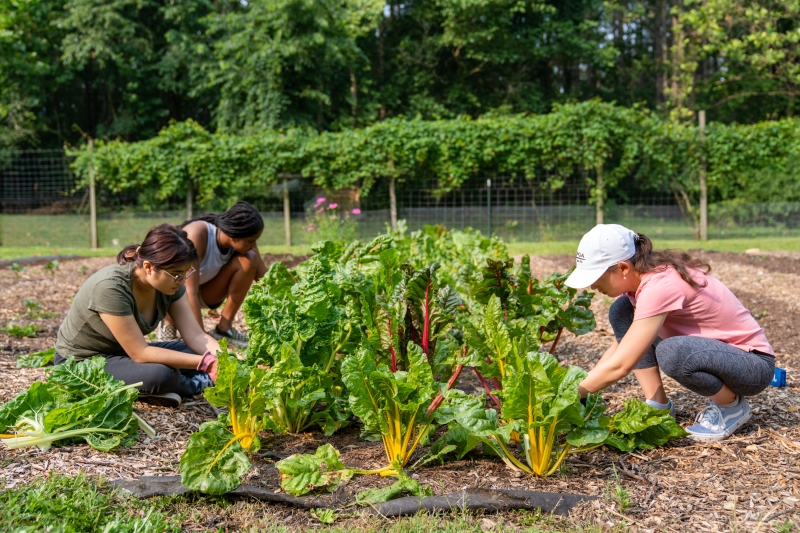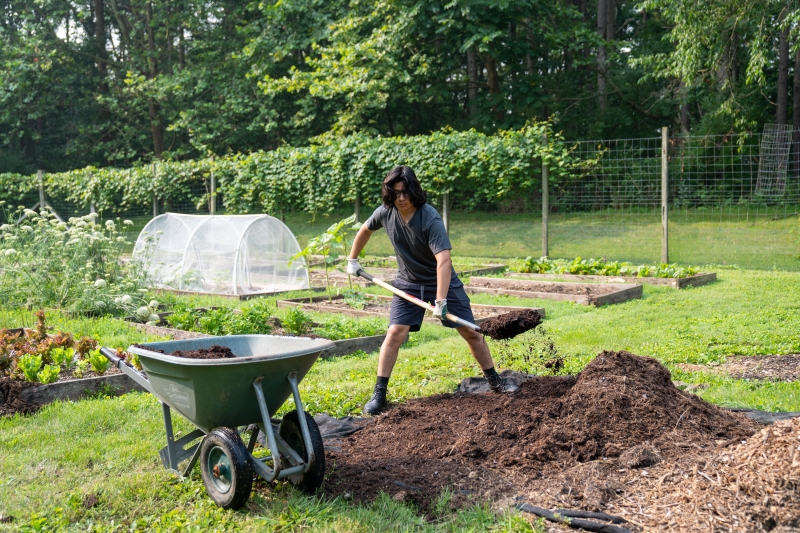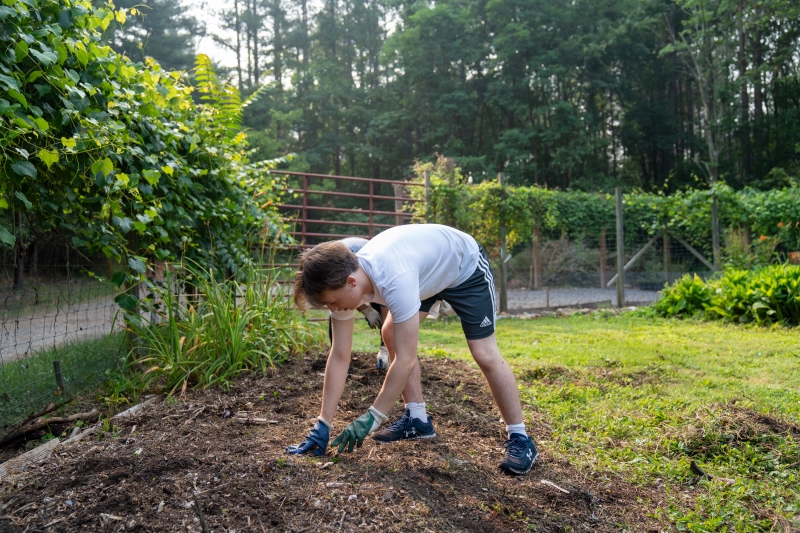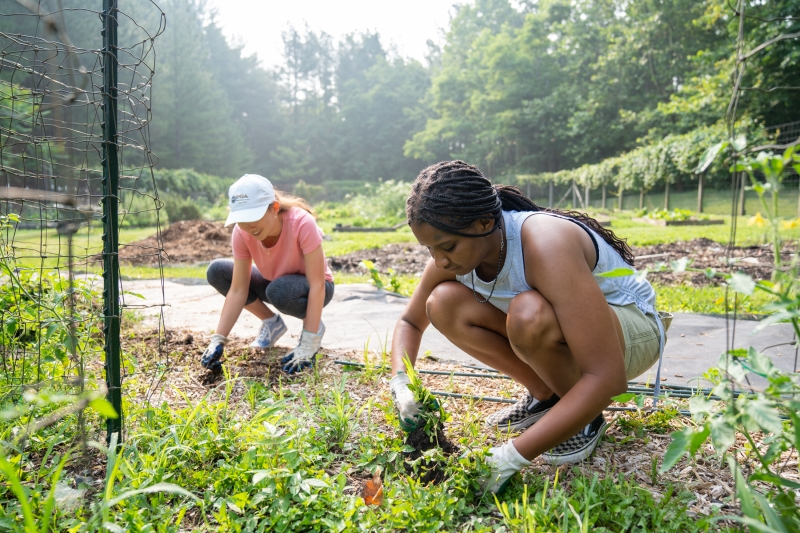Campus Garden Fosters Community, Sustainability and Healthy Living The university’s Campus Garden is a dedicated space growing organic produce for both the campus and local community.
It may be a hike to get there — literally, on a dirt path through the woods — but if you trek to Washington and Lee University’s back campus, you will be rewarded with an oasis: the Campus Garden.
Covering half an acre, the university’s Campus Garden is a dedicated space growing organic produce for both the campus and local community. It is sectioned off into different plots that are planted, maintained and harvested by W&L students.
Each year, the garden provides approximately 1,500 pounds of food for various campus groups, including Dining Services, Campus Kitchen and the Student Food Pantry. Campus Garden also recently introduced a rotating student plot; periodically, the garden partners with a student organization, and the organization’s members will choose what they want to plant and how to use the bounty.
Among the current crops in the garden are spinach, mixed greens, chard, root vegetables and herbs. According to Nicole Poulin, manager of Campus Garden, the produce regularly changes depending on the season and past results.
“We focus on what works well in the space and can get a good yield,” Poulin said. “We’re cautious of what plants are prone to disease and pests.”
The garden relies on the help of student volunteers, anywhere from eight to 20 individuals per term, who Poulin supervises. They range widely in majors and interests, including gardening enthusiasts, environmental advocates and those interested in preventative healthcare.
Among them is Allie Stankewich ’23, an environmental studies major who plans to pursue a career in medicine.
“I’m interested in the future of public health and environmental health work, and I think food is kind of at the crux of how we engage in the well-being of both people and the environment,” Stankewich said.
During her time at W&L, Stankewich also served on the leadership team of Campus Kitchen, an organization that helps feed the underserved and food insecure people in Rockbridge County. As part of her responsibilities, she completed various volunteer shifts in the garden and helped grow Campus Kitchen’s involvement.
“We had the opportunity to shift objectives of the garden from just selling produce to making it more of an educational and experiential learning space,” Stankewich continued. “Participating in individual exploration and research about the topic, and then getting to see it in practice, made me realize how special places like gardens become for meeting new people and having important conversations.”
These conversations extend beyond campus. Jerónimo Olmedo Reyes ’21, who double majored in biology and art history, volunteered with Campus Garden all four years at W&L. Currently, he is applying to medical schools while working at Montessori Academy of Languages in Pennsylvania, which has composting bins on site. He has been able to share his garden knowledge with the young students at the academy.
“I was wearing my Compost Crew t-shirt, because it has so much emotional value to me, and the kids asked what it was,” Olmedo Reyes said. “I told them that I used to do composting at school, too, but on a much larger scale. I explained the cycle of it in a more child-friendly and approachable way, and they reacted with a lot of ‘oohs’ and ‘ahhs.’ I felt like I had left what was hopefully a core memory for them.”
Mindful of sustainability — as well as its budget — Campus Garden is resourceful in its methods. In addition to its composting program, the garden uses water conservation techniques and experiments with plant growing techniques.
According to Poulin, many of the plant beds are built in a hügelkultur style, which is a sustainable permaculture technique. Underneath mounds of soil lay decaying wood, twigs, plants and weeding debris. As the decomposing plant material breaks down, it releases nutrients to the seeds planted on top.
These mounds aren’t particularly pretty, but they are extremely valuable. Instead of striving for the pristine aesthetics of a traditional landscaped space, Poulin and the volunteers focus on cultivating a healthy and natural ecosystem.
“The approach encourages beneficial insects and soil health, cuts down on the use of valuable resources, and eliminates the need for inorganic pesticides and herbicides — while still keeping our crops beautiful and viable,” Poulin said. “Sometimes that can look a little wilder compared to your traditional garden.”
“It’s a lot less about the pristine aesthetic of what a garden can be, like having zero weeds, and everything’s super neat, trimmed and cut back,” Stankewich said. “I’ve learned how letting nature run its course in a garden is honestly the most productive way to garden. In reality, the most efficient systems are the ones that are free and liberated by nature’s course.”
But that doesn’t mean the garden shies away from beauty. In addition to food, the Campus Garden also grows cutting, medicinal and native flowers. Planted late spring, the flowers bloom just in time for summer and are bought by staff and faculty for campus events. While the garden cannot mass produce flowers, the ability to supplement bouquets from local florists helps lessen the environmental impact.
“Commercial flowers typically travel pretty far to get to the floral shops, so if we can cut down on that transit, we love to help,” said Poulin, adding that the flowers are also great pollinators for the other crops.
Overall, Campus Garden has created an environmentally conscious, cyclical system that encourages education, provides nutrition and connects the community.
“I think the most philosophically engaging aspect of Campus Garden was how self-sustaining it is,” Olmedo Reyes said. “Seeing the life grow in front of me — and knowing that life would feed my peers, mentors and community — was extremely rewarding.”
 Carla Vela ’27, Elise Massey ’27 and Ella Wong ’27, participants in the AIM program, work in the Campus Garden.
Carla Vela ’27, Elise Massey ’27 and Ella Wong ’27, participants in the AIM program, work in the Campus Garden. Joel Sotelo Flores ’27, a participant in the AIM program, works in the Campus Garden.
Joel Sotelo Flores ’27, a participant in the AIM program, works in the Campus Garden. Ethan Babb ’27, a participant in the AIM program, works in the Campus Garden.
Ethan Babb ’27, a participant in the AIM program, works in the Campus Garden. Ella Wong ’27 and Elise Massey ’27, participants in the AIM program, work in the Campus Garden.
Ella Wong ’27 and Elise Massey ’27, participants in the AIM program, work in the Campus Garden.
You must be logged in to post a comment.